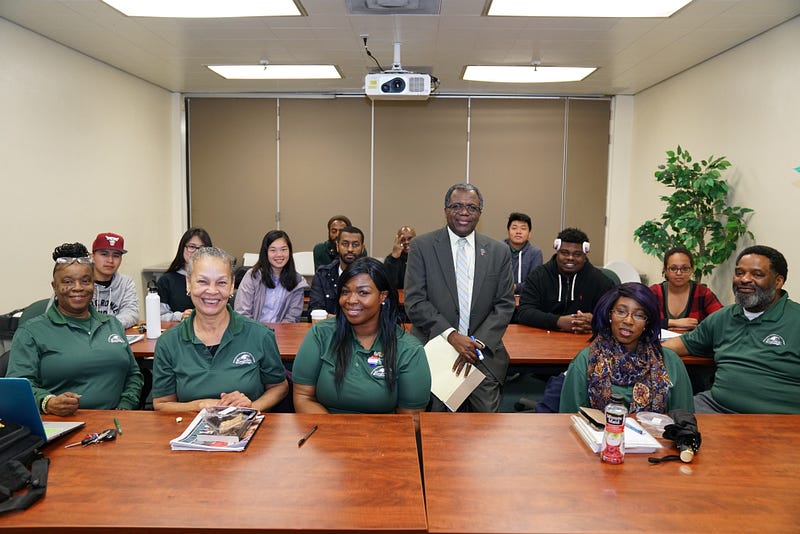Peralta community expresses worry about safety, homelessness
by Yohana Gebre

Chancellor Jowel C. Laguerre met with students, administrators, and faculty March 15 in several brainstorm sessions meant to allow students and faculty to voice concerns and to present possible solutions in a report that will be reviewed by the district.
Laguerre said that once they were done collecting the district’s concerns, on March 28, a report would be released stating the concerns expressed from the colleges and district and how the district plans to solve the concerns.
“We wanted to give the space for faculty, staff, students, and administrators to help us come up with the needs that we have,” Laguerre said.
The chancellor met with students and ASLC representatives, faculty, staff, and administrators.
Sharon Cornu, a strategic communications and community engagement consultant hired by the district, instructed those attending the ASLC meeting to break into groups, discuss their concerns, and write them on Post-it notes. She and the chancellor collected the Post-its for their report.

“Our intention is to do a thorough needs assessment of the district,” Laguerre said. “It may not be complete without knowing what your needs are.”
The chancellor said the purpose of these exercises was to hear concerns, make a combined report, and start planning which concerns can be addressed based on the district’s resources. Cornu said this strategy was based on what the administration has used in the past.
“This is a chance to think about the facilities issues that the chancellor was raising but also to think about other kinds of needs that would support your work as well as the students and the district,” Cornu said when she spoke to Laney administrators.
Students, administrators and faculty all held very similar concerns — the budget, safety, housing, homelessness support, lack of parking, and affordable transportation for students.
ASLC President Keith Welch and other student representatives noted that the lack of housing was a stressor affecting many students. He suggested hotel vouchers as a potential solution.
“I think that the Peralta district would benefit from hotels,” Welch said. “Two students could occupy one room with a hotel voucher.”
The chancellor and Cornu said emergency call boxes in district parking lots were neither functioning nor distributed evenly. They also said the facility buildings, especially the Student Center, needed to be upgraded and that staff members should receive more training.
Faculty and administrators stressed the need to share equity funds equally throughout different departments, redesign and modernize the Student Center and more actively help people feel safe while on campus, such as by fixing the emergency call boxes and getting security guards.
Cornu said that the purpose of the meeting was to identify what concerns the colleges have and present them to the district. Secondly, the district needs to know how much money those needs amount to, Laguerre said.
After the meeting on March 28. the district will release a report that has combined the colleges’ concerns and district’s ability to pay for the changes. Neither Cornu nor the chancellor made any indications as to how the concerns would be addressed by the district.
The chancellor made similar visits to College of Alameda, Berkeley City College and Merritt College.
Yohana Gebre is a writer for The Laney Tower

























